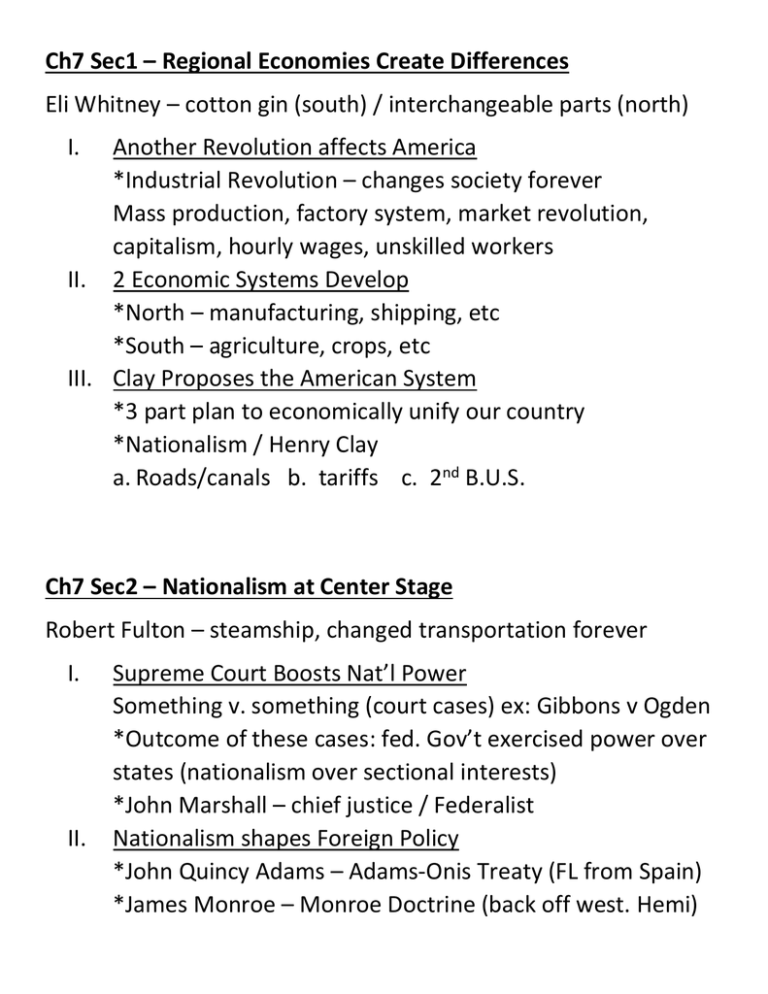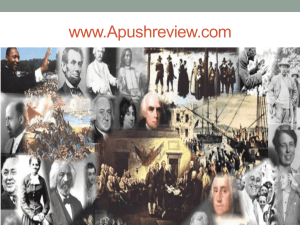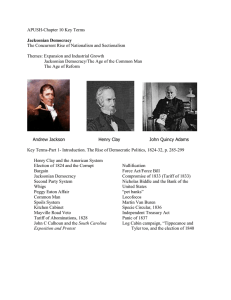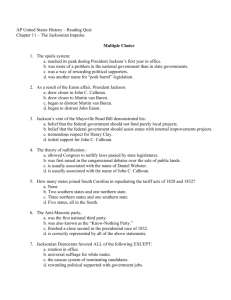Ch7Outline
advertisement

Ch7 Sec1 – Regional Economies Create Differences Eli Whitney – cotton gin (south) / interchangeable parts (north) I. Another Revolution affects America *Industrial Revolution – changes society forever Mass production, factory system, market revolution, capitalism, hourly wages, unskilled workers II. 2 Economic Systems Develop *North – manufacturing, shipping, etc *South – agriculture, crops, etc III. Clay Proposes the American System *3 part plan to economically unify our country *Nationalism / Henry Clay a. Roads/canals b. tariffs c. 2nd B.U.S. Ch7 Sec2 – Nationalism at Center Stage Robert Fulton – steamship, changed transportation forever I. II. Supreme Court Boosts Nat’l Power Something v. something (court cases) ex: Gibbons v Ogden *Outcome of these cases: fed. Gov’t exercised power over states (nationalism over sectional interests) *John Marshall – chief justice / Federalist Nationalism shapes Foreign Policy *John Quincy Adams – Adams-Onis Treaty (FL from Spain) *James Monroe – Monroe Doctrine (back off west. Hemi) III. Nationalism pushes America West *Missouri – slave state? Problem = upsets free-slave balance *Missouri Compromise – keeps balance (11:11) Add Maine as free state. Henry Clay the compromiser. *Adds a dividing line out west (south gets slavery, north barred from slavery) Ch7 Sec3 – Age of Jackson I. Expanding Democracy Changes Politics *Democrat-Republican Party (common man) More commoners are allowed to vote by the 1820’s *1824 – John Quincy Adams beats Andrew Jackson (“Corrupt bargain” – Jax won pop. Vote, and Clay swung the election to JQA, his buddy) II. Jackson’s New Presidential Style *1828 – Andrew Jackson beats JQA in landslide *White House Party / Spoils System (hooks up friends w/ jobs while firing many of JQA’s people) *Common people love him / Very nationalistic III. Removal of Native Americans *Indian Removal Act of 1830 – kicks out Indians past Mississippi River (people support it) *Worcester v. Georgia – Supreme Court defends Cherokee Jackson ignores Marshall, sends them on Trail of Tears Ch7 Sec4 – States’ Rights and National Bank *Daniel Webster – senator, powerful speaker, believed the Union (nationalism) should trump states’ rights (sectionalism) I. A Tariff Raises the States’ Rights Issue *Tariff of 1828 unfairly benefits North over South, so South Carolina vows to “nullify” law. *John C. Calhoun calls it a Tariff of Abominations *Haynes-Webster Debates – Who is right? The federal Gov’t or the State of South Carolina? *Calhoun quits VP post, goes home, and state of SC threatens secession *Jackson as Pres. vows to force SC to pay via Force Bill Henry Clay offers compromise of reduced tariffs over 10yrs II. Jackson Attacks the National Bank *Sees BUS as corrupt, vows to kill it. BUS supporters vow to see Jax fail at re-election. Jax wins easy in 1832, and bankrupts the BUS by putting its funds into….. *Pet Banks – small local banks that favor common folk and support Jackson. Problem = They overprint $$ Inflation! III. Van Buren Deals with Jackson’s Legacy *Panic of 1837 – BUS gone, but economy suffers for years *Martin Van Buren – pres. after Jax; looks bad due to Panic *Whig Party forms to oppose Jackson and Dem-Reps Play the “war hero” / common man card though most are wealthy elitists – Mostly weak and unsuccessful presidents





